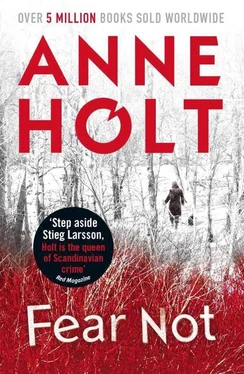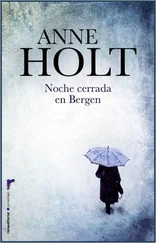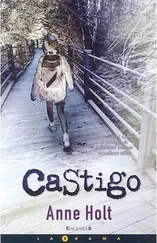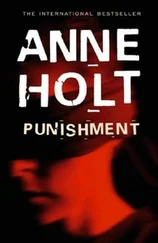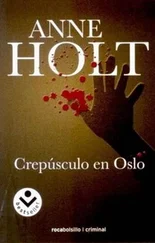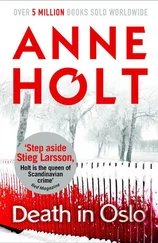There was something familiar about the face, but Astrid couldn’t quite place it. In a way the shape of the face and the straight nose reminded her of Lukas, but that had to be a coincidence. The woman in the photograph also had the same funny teeth, one front tooth lying slightly on top of the other, but after all lots of people had teeth like that. The singer Lill Lindfors, for example, as Astrid had often pointed out when they were young and she was besotted with everything about Lukas.
Despite the fact that she had no idea who the woman was, it struck her in some odd way that she had seen this photograph before. She just couldn’t remember where. As she stared at the woman she realized her headache had disappeared. Quickly, she put the photograph back, closed and locked the drawer and returned the key to its hiding place.
When she left Lukas’s study she closed the door carefully behind her, as if she really had done something forbidden.
***
The depressing piles of unsolved crimes in Silje Sørensen’s office were getting her down. There was barely room for a coffee cup on her crowded desk, even though everything was in neatly sorted files. She sat down on her chair, pushed aside a bundle of newspaper cuttings and put down the cup, before starting to go through the whole lot.
She had to reprioritize.
Her list of things to do was growing.
The Police Officers’ Association’s more or less legal actions and protests against terrible working conditions, low pay, inadequate staffing and the threat to pension entitlement had led to a somewhat acerbic tone in any dealings between the government and the police. Officers were no longer so willing to work overtime. Things didn’t get done as quickly nowadays. The organization’s 11,000-plus members were gradually beginning to take a fresh look at their priorities. Although the statistics hadn’t yet been processed, it looked as if the clear-up rate for 2008 had fallen dramatically in comparison with previous years – and it was only January. Employees were demanding their right to free time, and were off sick more frequently. Sometimes this coincided noticeably with public holidays and weekends, when major challenges awaited those who were charged with maintaining law and order.
The criminals were having an easier time all round.
People felt less and less safe. The police had always scored highly when it came to credibility and trustworthiness, but now they were losing the sympathy of the public. More and more frequently the papers were running stories about victims of violent crime who had been unable to report the offence because their local police station wasn’t manned, rural stations that were closed at weekends, and victims of crime who had to wait several days for the police to turn up and look for any clues. If they turned up at all, that is.
Silje Sørensen was a member of the union, but she had long since abandoned any attempt to keep a record of her overtime. The only yardstick she used was the reaction at home. When her sons became too much of a handful and her husband became more and more taciturn, she tried to spend more time at home. Otherwise, she sneaked off to work outside normal working hours as often as she could.
As the only child of a shipping owner, her decision to train as a police officer hadn’t exactly been expected. Her mother had gone into a state of shock and hysteria when she learned of her daughter’s career choice. This lasted throughout Silje’s first year in college. We’ve wasted a fortune on boarding schools in Switzerland and England, her mother wailed, and now my daughter is going to throw away her future working in the public sector! If she must get her hands dirty dealing with violent criminals and the like, then why on earth couldn’t she become a solicitor instead? Or a legal advisor within the police service, if the worst came to the worst?
That was exactly the reaction Silje had wanted.
Her father had beamed and kissed her on the forehead when she told him she had got into the Police Training Academy. That wasn’t exactly the idea.
Silje Sørensen had never rebelled as a child or a teenager. Never protested. Not when she was forced to move abroad at the age of ten, only seeing her parents during the holidays. Not when she had to spend two months at a French language school in Switzerland at the age of fifteen, where the working day began at 6.30 in the morning and the Catholic nuns had no qualms about using punishments that were probably forbidden under the Geneva Convention. Silje didn’t even argue with her father when he decided that she should squeeze five school years into two and a half; she gained a degree in English by the time she was nineteen. By then she had come of age, and as a reward for her silent patience and remarkable hard work, her father had transferred more than half of his fortune to his only daughter.
Training as a police officer was Silje Sørensen’s first deliberate act of rebellion.
When she was allocated to work with the legendary Hanne Wilhelmsen during her first year, she quickly realized that this stubborn, rebellious choice of career was going to make her happy. She loved it. The majority of what she knew about police work she had learned from her reluctant, uncommunicative mentor. Although Hanne Wilhelmsen had made herself more and more unpopular through her own headstrong approach, Silje had never ceased to admire her. When Inspector Wilhelmsen was shot during a dramatic incident in Nordmarka and paralysed from the waist down, Silje had grieved as if it had happened to a sister. She never really got over the fact that Hanne had then turned her back on the few remaining friends she had in the big shabby police headquarters on Grønlandsleiret.
Silje Sørensen was proud of her profession, but accepted with resignation the parameters within which she was forced to operate.
She decided to sort the cases in order of seriousness. Minor knife crimes and pub brawls with no life-threatening injuries she placed in a separate pile.
You’ll probably get away with it, she thought wearily, and tried to forget that several of the cases involved known perpetrators. Their victims would regard any attempt to abandon these investigations as highly provocative. However, that was the way it was, and according to every directive from both the public prosecutor and the National Police Board, she was perfectly justified in prioritizing more serious cases. The public might have some difficulty in understanding the police definition of serious, but that couldn’t be helped.
After about an hour the files had been sorted into five piles.
Silje finished off the dregs of her tepid coffee, then picked up three of the piles and placed them in the cupboard behind her.
Two left.
The smallest contained murders. Three files. The first very thin, the second almost as slim. The third was so fat that she had put two rubber bands around it to keep everything together.
Suddenly, she got up and went over to the noticeboard on the wall opposite her desk. She quickly scanned every piece of paper before placing one on the desk and dropping the rest into the large waste-paper basket beside it. She took three sheets of A4 out of the cupboard. They fitted next to each other perfectly at the top of the noticeboard.
Runar Hansen , she wrote with a red felt-tip on the first sheet.
19/11/08 .
On the next sheet she wrote Hawre Ghani .
24/11/08 .
She chewed the cap of the pen and thought for a moment before adding a question mark.
24/11/08?
It wasn’t possible at this stage to say exactly when Hawre Ghani had been murdered, but at least they had confirmation that he had, in fact, been murdered. The pathologist had found clear signs of garrotting. It was hardly likely that the boy had hanged himself with a steel wire until his head almost came away from his body, then thrown himself in the sea. They were only able to hint at the time of death, but so far the investigation had found no evidence to suggest that the boy had been alive after he went off with a client outside Oslo’s central station on Monday 24 November. All the CCTV cameras had, of course, been checked. No joy. This matched Martin Setre’s story: the man had approached them just outside the entrance.
Читать дальше
